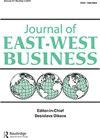An Analysis of the Effects of Cultural, Religious, and Linguistic Differences on International Trade
IF 0.9
Q4 BUSINESS
引用次数: 0
Abstract
AbstractThis study analyzes the effects of cultural, religious, and linguistic differences on bilateral trade. We conceptualize these differences as cultural distance, religious distance, religious denominations difference, language diversity, and linguistic distance. We collect trade data for more than 50 countries over ten consecutive years and build an augmented gravity model. The empirical analysis reveals that language diversity impedes trade, but variations in cultural distance and religiosity tend to facilitate bilateral trade. The findings suggest that cultural and religious dissimilarities between partners are not necessarily detrimental to international trade as some differences in culture and religiosity can promote international trade.Keywords: Culturegravity modelinternational tradelanguagereligiontrade Disclosure statementNo potential conflict of interest was reported by the authors.文化、宗教和语言差异对国际贸易的影响分析
摘要本文分析了文化、宗教和语言差异对双边贸易的影响。我们将这些差异定义为文化距离、宗教距离、宗教教派差异、语言多样性和语言距离。我们收集了50多个国家连续10年的贸易数据,建立了增强引力模型。实证分析表明,语言多样性会阻碍贸易,但文化距离和宗教信仰的差异往往会促进双边贸易。研究结果表明,合作伙伴之间的文化和宗教差异并不一定不利于国际贸易,因为文化和宗教信仰的一些差异可以促进国际贸易。关键词:文化重力模型国际贸易语言宗教贸易披露声明作者未发现潜在的利益冲突。
本文章由计算机程序翻译,如有差异,请以英文原文为准。
求助全文
约1分钟内获得全文
求助全文
来源期刊

Journal of East-West Business
BUSINESS-
CiteScore
2.10
自引率
26.70%
发文量
19
期刊介绍:
Journal of East-West Business is a quarterly journal that deals with contemporary and emerging aspects of business studies, strategies, development, and practice as they relate to the Russian Federation, the new republics of the Commonwealth of Independent States, and Eastern/Central Europe-and business relationships with other countries of the world. The Journal of East-West Business is international in scope and treats business issues from comparative, cross-cultural, and cross-national perspectives. The journal features an Editorial Advisory Board that represents the Russian Federation, Eastern/Central European, and Baltic states in this new business arena.
 求助内容:
求助内容: 应助结果提醒方式:
应助结果提醒方式:


